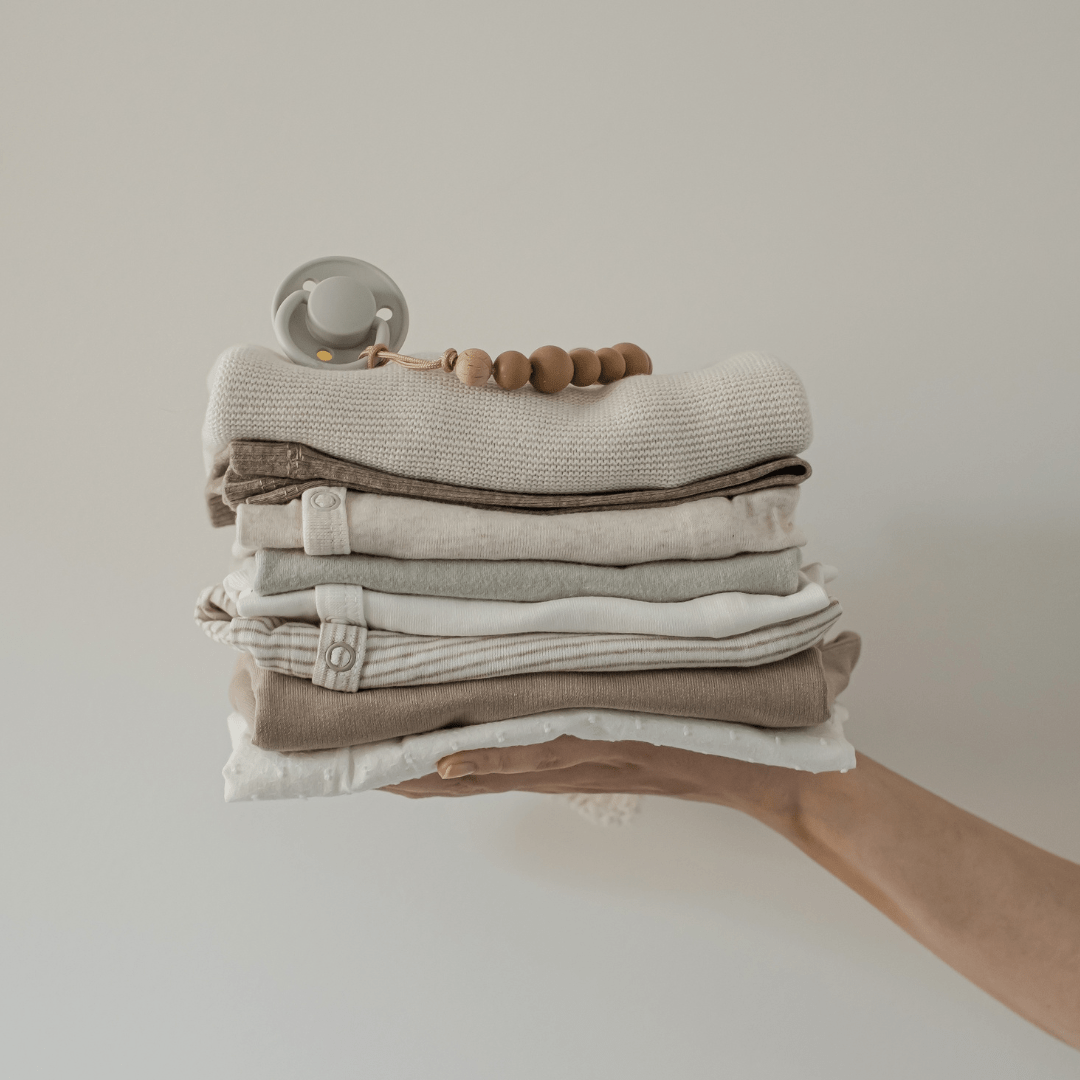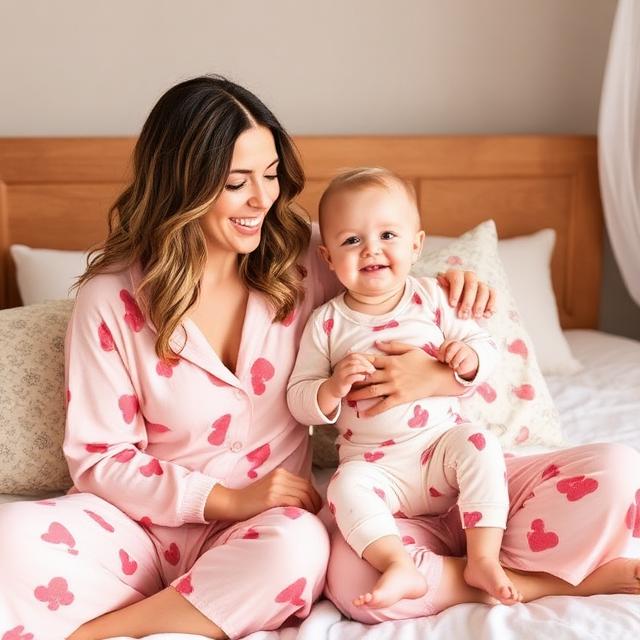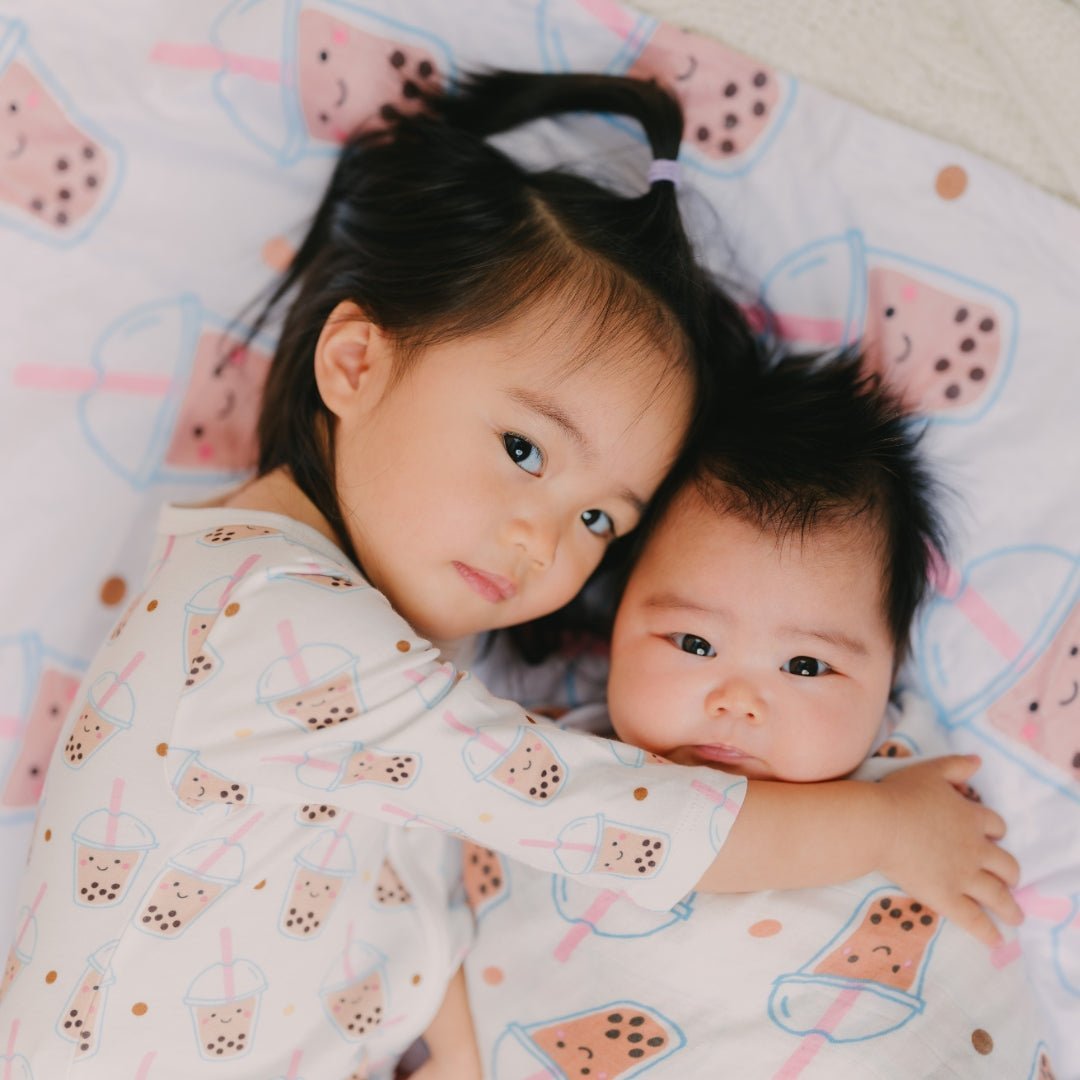Your Cart is Empty
Gift Sets
Categories

Why Organic Fabrics Are the Best Choice for Babies With Sensitive Skin
by Adrian Ma June 15, 2025 5 min read
As parents, one of our most important jobs is keeping our little ones safe, happy, and comfortable. This responsibility can feel even more daunting when your baby has sensitive skin or is prone to allergies. From red, irritated cheeks to unexpected rashes, it sometimes feels like even the softest blanket or cutest onesie can cause discomfort. That’s why more families are turning to organic baby clothing and home textiles as their go-to solution.
In this guide, we’ll break down why organic fabrics matter so much for sensitive skin, the real benefits for allergy-prone babies, and how to choose the safest, most comfortable essentials for your child and home.
1. What Makes Organic Fabrics Different?
Unlike conventional fabrics, organic fabrics are made from natural fibers, such as cotton or bamboo, grown without synthetic pesticides, herbicides, or harsh chemicals. This eco-friendly approach means fewer toxic residues in the final product, making organic baby clothing a gentler option for delicate skin.
Many traditional fabrics are treated with chemicals during processing - think formaldehyde, dyes, or flame retardants. For babies, especially those with eczema or sensitive skin, even trace amounts of these irritants can trigger redness, itchiness, or full-blown allergic reactions. By choosing organic cotton onesies or bamboo sleepwear, you’re skipping these risks and giving your little one the safest start possible.
Want to learn more about the difference? Check out our guide to the best natural ingredients for baby skin care.

2. Comfort, Breathability & Everyday Wear
Imagine wrapping your baby in a buttery-soft, breathable fabric that keeps them cool in the summer and warm in the winter. That’s exactly what organic cotton and bamboo blends offer. These natural fibers are not only gentle but also highly breathable, allowing air to circulate and moisture to wick away. This is especially important for newborns and toddlers, who often have trouble regulating their body temperature.
Overheating can lead to sweat, which may further irritate sensitive skin. Organic fabrics help reduce these issues, making them one of the best fabrics for sensitive skin. Many parents notice that their babies sleep more soundly and experience fewer night sweats when dressed in breathable organic pajamas or wrapped in an organic swaddling blanket.

3. The Best Allergy-Friendly Baby Products: What to Look For
When it comes to shopping for your baby, it’s easy to get overwhelmed by options. Here are a few things to keep in mind:
Choose Certified Organic:
Look for the GOTS (Global Organic Textile Standard) label or similar certifications. This ensures your baby’s clothing and bedding are genuinely organic.
Prioritize Everyday Essentials:
Start with items your child wears or uses every day, such as organic cotton bibs, onesies, and swaddle blankets. Babies spend so much time in these pieces, making it important to choose safe, chemical-free options.
Opt for Bamboo Blends:
Bamboo is naturally hypoallergenic, moisture-wicking, and antibacterial, making it a dream fabric for sensitive skin. Our bamboo rompers are crafted for maximum coziness—perfect for active play or bedtime snuggles.
Not sure where to start? Explore our curated collection of baby gift sets for inspiration.

4. Creating a Safe Haven: Beyond Clothing
Sensitive skin needs protection not only from clothes but also from everything your baby touches. Consider going organic with:
-
Bedding: An organic crib sheet or blanket reduces exposure to hidden chemicals while your baby sleeps.
-
Soft Toys: Babies love to snuggle and chew on their favorite plushies—so make sure they’re made from safe, non-toxic materials.
-
Home Textiles: Even nursery décor, changing pad covers, and playmats can harbor chemicals that irritate sensitive skin.
By choosing organic options throughout your home, you create a safer, cozier space for your baby to grow and explore.

5. Supporting a Healthier Lifestyle and Planet
There’s another bonus to choosing organic baby products: you’re supporting sustainable farming and responsible manufacturing. Organic cotton and bamboo are grown with less water, fewer chemicals, and more respect for the planet. This means you’re not only helping your child avoid exposure to toxins, but also contributing to a healthier world for their future.
Making mindful choices, like investing in organic cotton onesies or bamboo pajamas, sends a powerful message to your child: their health and the health of the planet are worth protecting.
6. Easy Steps for Switching to Organic Fabrics
Not sure how to begin? Here’s how to make the transition simple:
-
Start Small: Replace the basics first - onesies, pajamas, bibs.
-
Prioritize Sleepwear: Babies spend up to 16 hours a day sleeping. Switch to organic sleepwear for fewer nighttime irritations.
-
Gift Wisely: For friends and family, suggesteco-friendly baby shower gifts that focus on organic, allergy-safe essentials.
-
Upgrade Gradually: Replace bedding and nursery items with organic versions over time.
Conclusion: The Best Fabrics for Sensitive Skin Start With Organic
Choosing organic fabrics is one of the easiest and most effective ways to protect your baby’s sensitive skin from allergies and irritation. From organic cotton onesies and bamboo pajamas to hypoallergenic blankets and safe toys, you’ll find plenty of ways to create a healthier home and a happier baby.
Every purchase is a step toward a more comfortable, allergy-free childhood—and a better future for all. Ready to make the switch? Shop our collection oforganic baby essentials and discover why so many parents are making the change for good.
If you have questions about the best allergy-friendly baby products or want personalized recommendations, feel free to reach out to us at The Wee Bean. We’re always here to help you keep your little one healthy, happy, and safe—every step of the way!
--------------------------------
FAQ: Organic Fabrics for Babies with Sensitive Skin
1. Why are organic fabrics safer for babies with sensitive skin?
Organic fabrics—especially GOTS-certified organic cotton and bamboo—are grown and processed without harmful pesticides, dyes, or chemicals. This reduces the risk of residue-related skin irritation or allergic reactions, making them ideal for delicate baby skin.
2. How does organic cotton benefit babies prone to overheating?
Organic cotton is naturally breathable and lightweight, allowing better airflow. This helps prevent trapped sweat, reducing the likelihood of irritation or heat rashes, which is especially important when babies can't fully regulate their body temperature.
3. Are organic fabrics durable enough for frequent baby wear and washing?
Yes—organic cotton and bamboo are not only gentle but also resilient. Organic cotton becomes softer with each wash and can endure the frequent laundering typical of baby items, making it both practical and long-lasting.
4. Which organic fabrics are best for babies with eczema?
For eczema-prone infants, opt for organic cotton, bamboo blends. These materials are naturally hypoallergenic, moisture-wicking, and free of irritating additives, helping soothe sensitive skin and minimize flare-ups.
5. How can parents verify if a fabric is truly organic?
Look for reliable certifications like the Global Organic Textile Standard (GOTS). These labels guarantee that materials were grown, processed, and manufactured without harmful chemicals—ensuring authenticity and consumer trust.
Leave a comment
Comments will be approved before showing up.
Also in Latest Blog Posts

New Year, New Mindset for 2026: Embracing Body Positivity in Motherhood
by Adrian Ma January 27, 2026 6 min read
Learn how to embrace body positivity after pregnancy with practical, research-backed strategies for postpartum mothers in 2026.

The Ultimate Guide to Buying Baby Clothes: How Much Does Your Baby Actually Need?
by Adrian Ma January 11, 2026 5 min read
Welcoming a new baby is one of life’s most joyful milestones, but it also brings a long list of decisions, especially when it comes to choosing baby clothes. New parents often find themselves wondering, How many baby clothes does a newborn really need? or Should I buy more newborn sizes or skip ahead to 0–3 months?
Recently viewed products
Sign up to get 15% OFF your first order
Sign up to get the latest on sales, new releases and more …


